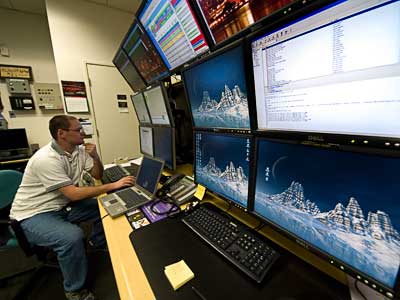

ISSUED BY: GCIS Communications Command Center
SOURCE: POPSCI
14February2011 9:57amEST
GCIS TECHNOLOGY UPDATE: If you could put all the data in the world onto CDs and stack them  up, the pile would stretch from the Earth to beyond the moon, according to a new study. The world’s technological infrastructure has a staggering capacity to store and process information, reaching 295 exabytes in 2007, a reflection of the world’s almost complete transition into the digital realm. That's a number with 20 zeroes behind it, in case you're wondering.
up, the pile would stretch from the Earth to beyond the moon, according to a new study. The world’s technological infrastructure has a staggering capacity to store and process information, reaching 295 exabytes in 2007, a reflection of the world’s almost complete transition into the digital realm. That's a number with 20 zeroes behind it, in case you're wondering.
Martin Hilbert and Priscila López took on the unenviable task of figuring out how much information is out there, and how its storage and processing have changed over time. Some of their findings seem obvious, like the fact that Internet and phone networks have grown at quite a clip (28 percent per year), while TV and radio grew much more slowly. But others are more surprising, like the nugget that 75 percent of the world’s stored information was still in analog format in 2000, mostly in the form of video cassettes. By 2007, 94 percent of the world’s info was digital. (read full report)
 unleash new insights into how the brain works.
unleash new insights into how the brain works. time since she was shot in the forehead, her spokesman said Wednesday, yet another significant milestone in her recovery from a traumatic brain injury.
time since she was shot in the forehead, her spokesman said Wednesday, yet another significant milestone in her recovery from a traumatic brain injury.

 magnetic stimulation, the activity of certain brain nerve cells can be deliberately influenced. What happens in the brain in this context has been unclear up to now. Medical experts from Bochum under the leadership of Prof. Dr. Klaus Funke (Department of Neurophysiology) have now shown that various stimulus patterns changed the activity of distinct neuronal cell types. In addition, certain stimulus patterns led to rats learning more easily.
magnetic stimulation, the activity of certain brain nerve cells can be deliberately influenced. What happens in the brain in this context has been unclear up to now. Medical experts from Bochum under the leadership of Prof. Dr. Klaus Funke (Department of Neurophysiology) have now shown that various stimulus patterns changed the activity of distinct neuronal cell types. In addition, certain stimulus patterns led to rats learning more easily.